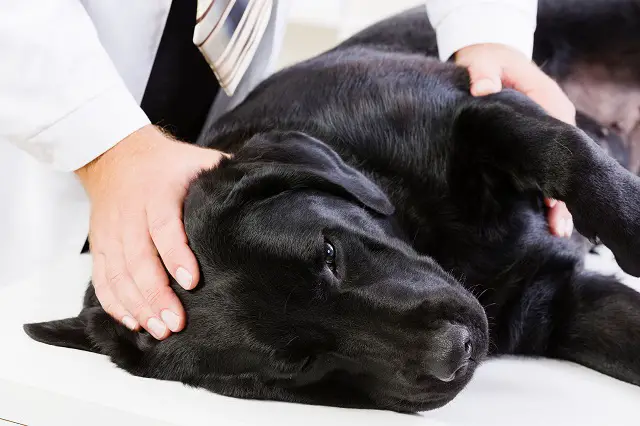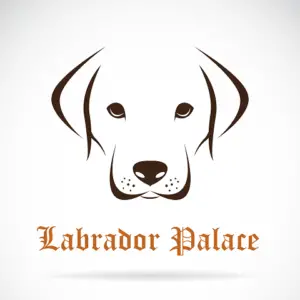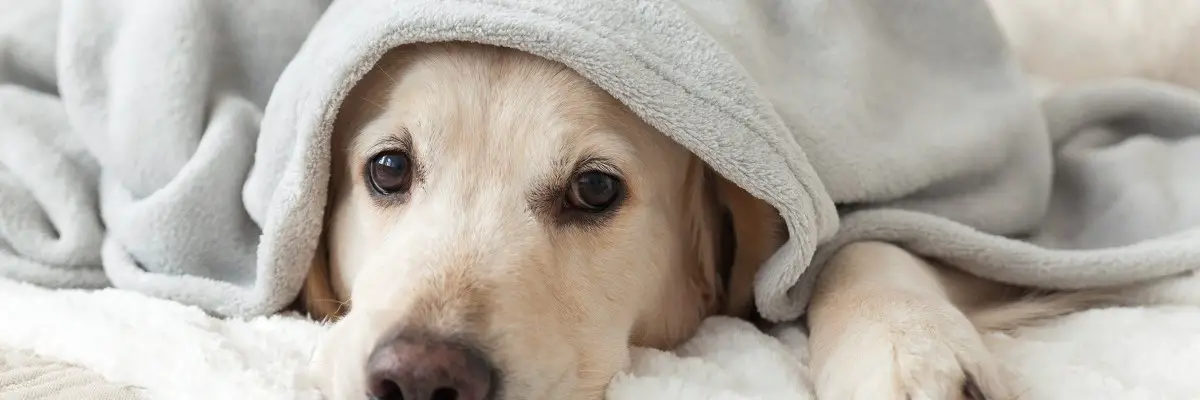My Labrador Has A Cold: In the same way as humans, your Labrador can contract respiratory infections that cause them to sneeze and cough. However, your Labrador could suffer from a more serious condition if they exhibit cold symptoms. Whenever people discuss getting a cold, they are actually referring to a variety of viruses.
Humans are susceptible to several different kinds of viruses that cause colds, including rhinoviruses, respiratory syncytial viruses, influenza viruses, and parainfluenza viruses. A cold virus is categorized as a member of this group because it causes similar symptoms, including sneezing, runny noses, sore throats, and general malaise.
Dogs also get colds due to similar factors. There is no specific virus that causes cold symptoms in dogs. Instead, many viruses can cause symptoms of colds in dogs. The severity of a Labrador cold may vary from one dog to another, which is why the symptoms of a cold should be treated more seriously than they would be for an individual.
Signs Your Labrador Has a Cold
A cold is an upper respiratory infection that causes the following symptoms:
| Mild fever | Loss of appetite |
| Runny eyes | Sneezing |
| Nasal congestion and discharge | Difficulty breathing through the nose |
| An occasional, “wet” cough, unlike the kennel cough’s dry | Hacking |
| Honking cough | General lethargy |
Although uncomfortable for your Labrador, these symptoms are not severe. Dogs will recover from a cold in a week without any treatment if they are kept warm and hydrated. Cold symptoms don’t just include coughing, sneezing, and running eyes and nose. Bacterial or parasitic infections, such as heartworms and roundworms, can also cause coughing. Fungal infections and allergies can also cause cold-like symptoms, causing lung damage and pneumonia.
Treating your Labradors cold
If your Labrador gets better on his own, there is a chance he won’t need any treatment. Your Labrador will feel better within a few days to a week if they have only mild symptoms of a ‘dog cold,’ continues to eat and drink as usual, and has the same energy level as usual. If your Labradors seem to be suffering from more than a mild cold, are not eating or drinking, are clearly uncomfortable, or are having trouble breathing, contact your veterinarian as soon as possible.
If your veterinarian suspects your Labrador’s illness is serious, diagnostic tests may be needed. The veterinarian will ask you about your Labrador’s flu or cold symptoms, perform a full physical examination, and look for any signs of infection. Your vet may recommend antibiotics, cough suppressants, and fluids depending on the diagnosis.
How to Treat your Labradors Cold at Home
Dogs and people are both susceptible to colds, which can be contagious. You can give your Labrador some home remedies during a cold to make them more comfortable. Take these steps to make your pet more comfortable when they’re sick:
| Use a warm mist vaporizer close to the sleeping area of your Labrador to moisten their bronchial tubes. |
| Use a balm to prevent their noses from becoming dry or itchy. |
| If it’s cold outside, stay indoors as much as possible. Cold air tends to constrict the bronchial tubes of labradors, making breathing more difficult for them. |
| Offering extra nutrition like boiled chicken and brown rice will encourage your Labrador to eat more. This will keep them healthy and prevent them from getting sick. |
| Encourage your Labrador to drink liquids with low sodium chicken broth if necessary. As a result, your Labrador will have thinner nasal secretions that are less likely to clog his nose. |
| Provide your Labrador with a comfortable sleeping area so that he can get a good night’s sleep. |
| Add herbal supplements like echinacea, cinnamon, coconut oil, and Plantago lanceolata to his meals, as well as honey, cinnamon, coconut oil, and Plantago lanceolata. They can help build up the body’s immunity, treat coughing, and enhance immunity. |
Over-the-Counter Cold Medicine For Your Labradors Cold
If you are giving your Labrador cold medicine, you must obtain approval from your veterinarian regarding the type and dosage. Your veterinarian can prescribe small doses of cold medicines containing dextromethorphan for puppies and adults. Veterinarians prescribe Robitussin, Benylin, and Siltussin for sick Labradors. You should know that children’s cold medicine will not cure your Labrador’s cold but may relieve their symptoms and help them feel more comfortable during their illness.

When To See Your Vet For Your Labradors Cold.
Finding out if your Labrador needs medical care starts with recognizing its symptoms. There is a possibility that your Labrador has a cold, but you need to decide whether it is worth taking them to the vet. Respiratory infections can usually clear up by themselves. A layperson may find it hard to gauge the severity of a Labrador’s condition.
A vet should be consulted if your Labrador has symptoms that are similar to those associated with a cold. Dogs with weaker immune systems are more likely to develop pneumonia due to colds. Due to this, many Labrador owners prefer to consult a veterinarian if their dog is ill.
| A rattle can be heard in the dog’s chest. | They stop drinking. |
| The dog is clearly in pain. | As symptoms intensify, they become more severe. |
In many cases, veterinarians prescribe antibiotics to treat illnesses. Because antibiotics cannot treat viruses, they can kill opportunistic, invading bacteria that cause even more illness in dogs while their immune systems try to fight the initial infection.

Is it a cold or Kennel Cough?
Known as kennel cough, canine infectious tracheobronchitis is a highly contagious respiratory disease. The virus is named after the most common place it is spread – kennels. The presence of many dogs at kennels and other places where dogs congregate makes it easy for them to catch and spread viruses. Dogs and puppies with compromised immune systems are more likely to suffer complications from kennel cough, even if the infection is treatable. It is most common for dogs with kennel cough to develop a dry, honking cough. It is sometimes compared to the sound of a honking goose.
The symptoms of kennel cough include sneezing, a runny nose, lethargy, loss of appetite, and a low fever. Dogs with colds can also present with symptoms of many of these conditions, so you should consult your veterinarian if possible.
Is it possible for Labrador to catch a cold from humans?
It is extremely unlikely for humans to infect dogs with a cold. Common cold symptoms rarely occur in humans and dogs simultaneously, so you shouldn’t worry about infecting your Labrador with your cold. It is unlikely that you will catch a cold from your Labrador. Although this is true, other dogs within the household or neighborhood might also be infected. As long as your Labrador is feeling better, keep him away from other dogs.
Preventing Colds For Your Labrador
If you want to avoid your Labrador catching a cold, avoid exposing them to other dogs, especially indoors. You may end up having to board your Labrador or send it to doggy daycare or training class. In the event your Labrador contracts a respiratory infection, such as Bordetella, parainfluenza, or canine flu, a current vaccination will increase the chances of their symptoms being milder.


